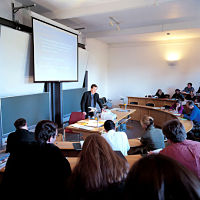Teaching leadership critically: New directions for leadership pedagogy. (2015)

“…(teaching) heroic models of leadership has legitimised the over-concentration of power, encouraged hubris rather than humility … and played a significant part in business scandals.”
David Collinson, Lancaster University, and Dennis Tourish, Royal Holloway University of London.
Academy of Management Learning & Education, 14(4), 576-594, 2015.
“Over the past 50 years or so, leadership has been one of the most widely taught subjects in business schools around the world.
“… most leadership courses adhere to a rather narrow set of psychological assumptions and approaches that, in privileging the role of powerful individuals, are highly ‘leader-centred’.
“….. (such) heroic models of leadership have legitimised the over-concentration of power, encouraged hubris rather than humility, helped to disempower employees, and played a significant part in business scandals. Neither society nor its organizations have benefitted
“This article examines the pedagogical potential of critical leadership studies (CLS): an emergent, alternative paradigm questioning deep-seated assumptions that power and agency should be vested in the hands of a few leaders and exploring the dysfunctional consequences of such power dynamics for individuals, organizations, and societies. It also recognizes that follower compliance and conformity, as well as resistance and dissent, are important features of leadership dynamics.
“Informed by our own experience of trying to teach leadership more critically, this essay highlights a number of guiding principles that we have used in the classroom to encourage a more questioning approach from our students in their study of leadership.”
Access the full article here: Teaching leadership critically.






Leave a comment
Back to the top